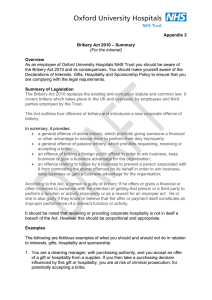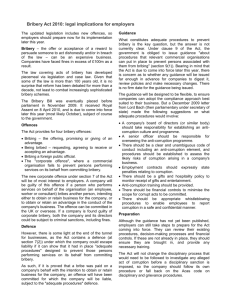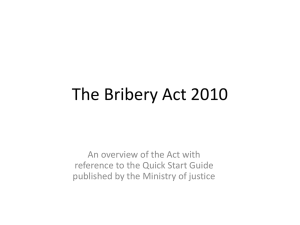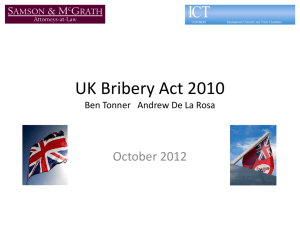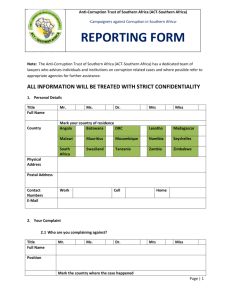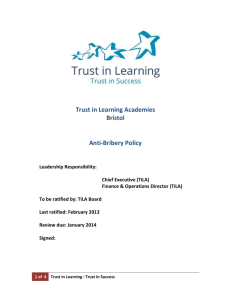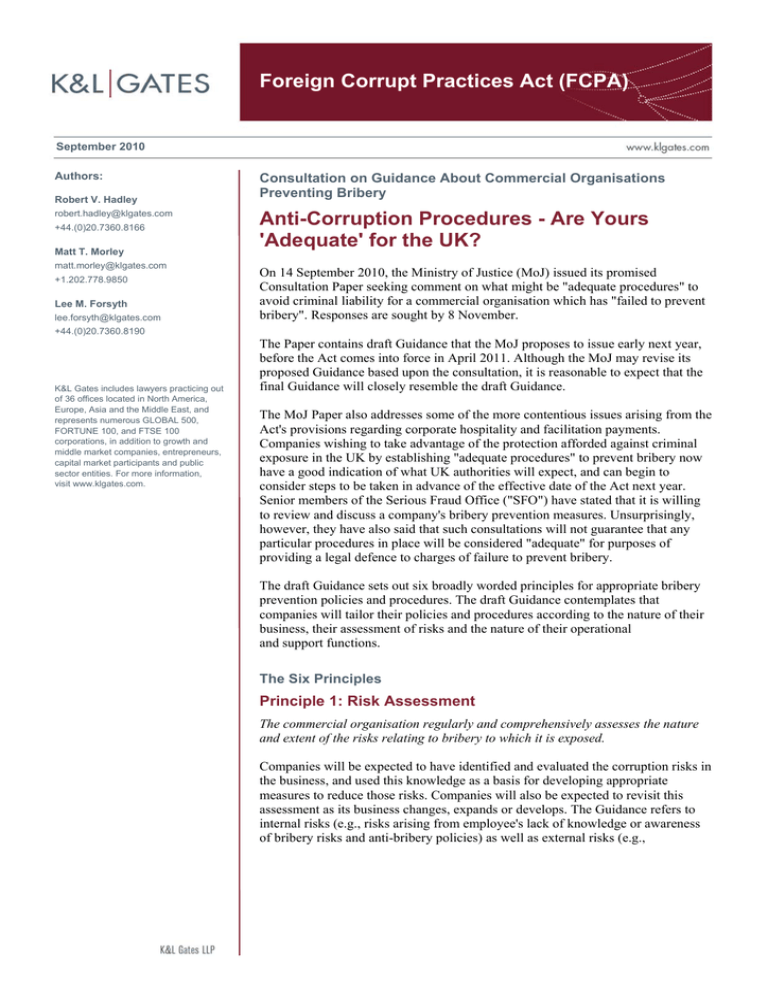
Foreign Corrupt Practices Act (FCPA)
September 2010
Authors:
Robert V. Hadley
robert.hadley@klgates.com
+44.(0)20.7360.8166
Matt T. Morley
matt.morley@klgates.com
+1.202.778.9850
Lee M. Forsyth
lee.forsyth@klgates.com
Consultation on Guidance About Commercial Organisations
Preventing Bribery
Anti-Corruption Procedures - Are Yours
'Adequate' for the UK?
On 14 September 2010, the Ministry of Justice (MoJ) issued its promised
Consultation Paper seeking comment on what might be "adequate procedures" to
avoid criminal liability for a commercial organisation which has "failed to prevent
bribery". Responses are sought by 8 November.
+44.(0)20.7360.8190
K&L Gates includes lawyers practicing out
of 36 offices located in North America,
Europe, Asia and the Middle East, and
represents numerous GLOBAL 500,
FORTUNE 100, and FTSE 100
corporations, in addition to growth and
middle market companies, entrepreneurs,
capital market participants and public
sector entities. For more information,
visit www.klgates.com.
The Paper contains draft Guidance that the MoJ proposes to issue early next year,
before the Act comes into force in April 2011. Although the MoJ may revise its
proposed Guidance based upon the consultation, it is reasonable to expect that the
final Guidance will closely resemble the draft Guidance.
The MoJ Paper also addresses some of the more contentious issues arising from the
Act's provisions regarding corporate hospitality and facilitation payments.
Companies wishing to take advantage of the protection afforded against criminal
exposure in the UK by establishing "adequate procedures" to prevent bribery now
have a good indication of what UK authorities will expect, and can begin to
consider steps to be taken in advance of the effective date of the Act next year.
Senior members of the Serious Fraud Office ("SFO") have stated that it is willing
to review and discuss a company's bribery prevention measures. Unsurprisingly,
however, they have also said that such consultations will not guarantee that any
particular procedures in place will be considered "adequate" for purposes of
providing a legal defence to charges of failure to prevent bribery.
The draft Guidance sets out six broadly worded principles for appropriate bribery
prevention policies and procedures. The draft Guidance contemplates that
companies will tailor their policies and procedures according to the nature of their
business, their assessment of risks and the nature of their operational
and support functions.
The Six Principles
Principle 1: Risk Assessment
The commercial organisation regularly and comprehensively assesses the nature
and extent of the risks relating to bribery to which it is exposed.
Companies will be expected to have identified and evaluated the corruption risks in
the business, and used this knowledge as a basis for developing appropriate
measures to reduce those risks. Companies will also be expected to revisit this
assessment as its business changes, expands or develops. The Guidance refers to
internal risks (e.g., risks arising from employee's lack of knowledge or awareness
of bribery risks and anti-bribery policies) as well as external risks (e.g.,
Foreign Corrupt Practices Act (FCPA)
countries with apparent high levels of corruption
or transactions involving public procurement or
unfamiliar intermediaries). Those undertaking the
assessment of risk should be adequately skilled,
and using external professionals may be
advisable, depending on the organisation
and its activities.
Principle 2: Top Level Commitment
The top level management of a commercial
organisation (be it a board of directors, the
owners or any other equivalent body or person)
are committed to preventing bribery. They
establish a culture within the organisation in
which bribery is never acceptable. They take
steps to ensure that the organisation’s policy to
operate without bribery is clearly communicated
to all levels of management, the workforce and
any relevant external actors.
The draft Guidance gives examples of the kinds
of leadership expected on anti-corruption issues,
such as a high-level statement of commitment to
counter bribery in all parts of the organisation's
operations and a demonstration of a commitment
to anti-bribery efforts in the organisation's
management structure. The SFO regards it as
crucial for boards of directors to demonstrate
their commitment to preventing bribery in their
organisation, and the draft Guidance suggests that
a senior manager oversee the organisation's
response to any incidents of bribery that occur.
Principle 3: Due Diligence
The commercial organisation has due diligence
polices and procedures which cover all parties to
a business relationship, including the
organisation’s supply chain, agents and
intermediaries, all forms of joint venture and
similar relationships and all markets in which the
commercial organisation does business.
The draft Guidance provides that companies must
know who they are doing business with and
should make appropriate enquiries to identify and
counter the risks of bribery in any particular
business relationship. Among other things,
companies will be expected to consider
the following:
Location. Is there a particular risk of bribery
within a particular country? If so, what are the
types of bribery commonly encountered? The
draft Guidance makes clear that efforts to justify
improper payments as simply following "local
custom" will not be viewed sympathetically.
Business Opportunity. The procedures will be
expected to review (and address) what corruption
risks exist with each new business opportunity.
Public contracts will require particular attention
but the Act is not limited to dealings with public
bodies.
Business Partners. Do organisations involved in
key decisions such as joint venture partners or
contractors have a reputation for bribery? Does
the business relationship involve a prominent
public office holder?
These are very familiar to parties addressing
corruption risk in the context of the US Foreign
Corrupt Practices Act ("FCPA"), where it is
essential to be alert for - and then to address –
so-called "red flags". These same considerations
flow through the draft Guidance. At the same
time, it is vital to remember that, unlike the
FCPA, the Bribery Act prohibits not only bribery
of foreign public officials, but also commercial
bribery of any person, anywhere.
Principle 4: Clear, Practical and
Accessible Policies and Procedures
The commercial organisation’s policies and
procedures to prevent bribery being committed
on its behalf are clear, practical, accessible and
enforceable. Policies and procedures take
account of the roles of the whole work force from
the owners or board of directors to all
employees, and all people and entities over
which the commercial organisation has control.
The draft Guidance suggests that such
documentation could include, as well as a clear
prohibition on all forms of bribery, guidance on
the provision of bona fide hospitality and advice
on relevant laws and regulations.
Principle 5: Effective
implementation
The commercial organisation effectively
implements its anti-bribery policies and
procedures and ensures they are embedded
throughout the organisation. This process
ensures that the development of polices and
procedures reflects the practical business issues
that an organisation’s management and
workforce face when seeking to conduct business
without bribery.
As expected, an organisation’s anti-bribery
procedures will not be considered to be
“effective” if they consist of nothing more than a
list of policies and procedures. The draft
September 2010
2
Foreign Corrupt Practices Act (FCPA)
Guidance states that designated individuals
should be responsible for implementing the
organisation's bribery prevention programme, and
that the effectiveness of the programme be
reviewed in the light of the company’s experience
and changes in its business. Organisations will be
expected to identify those with direct
responsibility for the programme, for monitoring
compliance with it, and for responding to
incidents and reports.
Principle 6: Monitoring and Review
The commercial organisation institutes
monitoring and review mechanisms to ensure
compliance with relevant policies and procedures
and identifies any issues as they arise. The
organisation implements improvements where
appropriate.
Organisations should consider what internal
checks and balances are needed to monitor
compliance with its policies and to address
potential violations. In this regard, the accounting
and internal audit functions have roles to play and
need to be aware of risks and indicators that may
tend to raise corruption concerns. Larger
organisations will need to consider financial
monitoring, bribery reporting and incident
management procedures, and confidential
reporting lines will surely be viewed as necessary
in all but the smallest businesses.
Illustrative Scenarios
The Consultation Paper considers several
scenarios that may be encountered by commercial
organisations doing business in foreign markets
and demonstrates how each of the six principles
could have been considered and applied by the
organisation. The stated aim is to assist
organisations in establishing the procedures that
they should adopt in order to prevent bribery on
their behalf. The illustrations cover:
intermediaries and agents; hospitality and
promotional expenditure; business partners - joint
ventures, consortia etc; facilitation payments; and
political and charitable donations. In practice
organisations should test their procedures against
the enquiries suggested.
Adjusting FCPA Compliance
Programmes
In our previous alert in June 2010, we noted that
existing compliance programmes tailored to the
FCPA may not translate into "adequate
procedures" for the purposes of the Bribery Act.
As well as the fact that the UK law covers bribery
of private persons in addition to foreign public
officials, we noted issues relating to the FCPA's
exceptions for corporate hospitality and
facilitation payments. The Consultation Paper
makes some comment on those difficult issues,
although such comments do not establish an
express "safe harbour".
Hospitality and Promotional Expenditure
There is considerable concern that what would
be seen by most businesses as legitimate
corporate hospitality or entertainment might
amount to an offence under the Act. This is
particularly so in relation to the new offence
under section 6 of the Act of Bribery of a
Foreign Public Official. For that offence if a
foreign public official is given, offered or
promised a financial or other advantage the only
intention required is that this was done to
influence the official in his or her role as an
official and to obtain or retain an advantage in
business. Much routine hospitality could be said
to be provided with those intentions, and so be
potentially criminalised where the recipient was
a foreign public official.
The draft Guidance indicates that, in some
circumstances, the payment of travel or
accommodation costs for a foreign public official
may not amount to a "financial or other
advantage" to the relevant official, as it is a cost
that would otherwise have been borne by the
relevant foreign government rather than the
official himself. The draft Guidance gives an
example of a company demonstrating its
expertise within a particular field by providing
an official with travel and lodgings in order to
visit an overseas site. If this comment is repeated
in the final Guidance it will support a defence
that such conduct should not be considered to be
an offence under the Act.
Reasonable and proportionate hospitality, is also
said in the draft Guidance to be unlikely to be
considered bribery of a foreign public official
under the Act. However, the greater the
expenditure provided to the public official, the
greater the inference will be that it is intended to
influence the official, and thus to fall
within the offence.
In addition to the MoJ Guidance on adequate
procedures, the Attorney General will be issuing
Guidance addressing when an offence might be
committed under the Act, and when it may not
be in the public interest for conduct to be
prosecuted. This Guidance is aimed at
practitioners and may provide greater
clarification in particular as to when hospitality
September 2010
3
Foreign Corrupt Practices Act (FCPA)
expenditure will be a breach of the Act and when
particular conduct, such as, perhaps, facilitation
payments will generally lead to prosecution.
Facilitation Payments
The draft Guidance confirms that the Act adopts
a zero-tolerance policy in relation to facilitation
payments. Thus, it should be expected that if a
company's policy permits facilitation payments,
even if it is primarily a US company, where the
FCPA permits them, it will not have "adequate
procedures" and may be guilty of failure to
prevent bribery if unlawful payments are made.
At the same time, the SFO Director has stated
that it is highly unlikely that a single incident of a
facilitation payment being made will lead to the
company being prosecuted if the payment is
discovered by internal procedures and individuals
involved are told that their behaviour is
not to be tolerated.
Conclusion
The Bribery Act will apply to any business with
a presence in the UK , and the authorities'
determination to pursue foreign corruption
cannot be doubted. The new "failure to prevent"
offence will expose companies to the risk of
bribery prosecution as never before - in the UK
and, many have suggested, worldwide. The Act
does give the opportunity to protect companies
against that risk by scrutinising the Guidance and
good practice recommendations and dedicating
themselves to "adequate procedures". Standard
US FCPA policies are likely to require some
adjustment in order to give that protection, and
businesses with such policies in place should
review them against the new UK standards.
Anchorage Austin Beijing Berlin Boston Charlotte Chicago Dallas Dubai Fort Worth Frankfurt Harrisburg Hong Kong London
Los Angeles Miami Moscow Newark New York Orange County Palo Alto Paris Pittsburgh Portland Raleigh Research Triangle Park
San Diego San Francisco Seattle Shanghai Singapore Spokane/Coeur d’Alene Taipei Tokyo Warsaw Washington, D.C.
K&L Gates includes lawyers practicing out of 36 offices located in North America, Europe, Asia and the Middle East, and represents numerous
GLOBAL 500, FORTUNE 100, and FTSE 100 corporations, in addition to growth and middle market companies, entrepreneurs, capital market
participants and public sector entities. For more information, visit www.klgates.com.
K&L Gates comprises multiple affiliated entities: a limited liability partnership with the full name K&L Gates LLP qualified in Delaware and
maintaining offices throughout the United States, in Berlin and Frankfurt, Germany, in Beijing (K&L Gates LLP Beijing Representative Office),
in Dubai, U.A.E., in Shanghai (K&L Gates LLP Shanghai Representative Office), in Tokyo, and in Singapore; a limited liability partnership (also
named K&L Gates LLP) incorporated in England and maintaining offices in London and Paris; a Taiwan general partnership (K&L Gates)
maintaining an office in Taipei; a Hong Kong general partnership (K&L Gates, Solicitors) maintaining an office in Hong Kong; a Polish limited
partnership (K&L Gates Jamka sp.k.) maintaining an office in Warsaw; and a Delaware limited liability company (K&L Gates Holdings, LLC)
maintaining an office in Moscow. K&L Gates maintains appropriate registrations in the jurisdictions in which its offices are located. A list of the
partners or members in each entity is available for inspection at any K&L Gates office.
This publication is for informational purposes and does not contain or convey legal advice. The information herein should not be used or relied
upon in regard to any particular facts or circumstances without first consulting a lawyer.
©2010 K&L Gates LLP. All Rights Reserved.
September 2010
4

